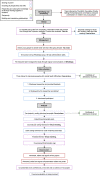Reflections, impact and recommendations of a co-produced qualitative study with young people who have experience of mental health difficulties
- PMID: 32515538
- PMCID: PMC8137486
- DOI: 10.1111/hex.13088
Reflections, impact and recommendations of a co-produced qualitative study with young people who have experience of mental health difficulties
Abstract
Background: There is limited evidence of genuine equal partnership where power is shared with young people with mental health difficulties throughout all research stages, particularly in data collection and analysis.
Objective: To describe how our qualitative study, exploring young peoples' perceptions on the feasibility of using technology to detect mental health deterioration, was co-produced using principles of co-production, whilst reflecting on impact, challenges and recommendations.
Methods: Young people with experience of mental health difficulties were appointed and then worked with researchers throughout all research stages. The study was evaluated against the five principles of co-production. Reflections from researchers and young people were collected throughout.
Results: Seven young people formed an initial Young People's Advisory Group (YPAG); three became co-researchers. Reflection was key throughout the process. Sharing power became easier and more evident as trust, confidence and mutual respect grew over time, particularly after a safe space was established. The safe space was crucial for open discussions, and our WhatsApp group enabled continual communication, support and shared decision-making. The resulting co-produced topic guide, coding framework, thematic map, papers and presentations demonstrated significant impact.
Conclusions: To our knowledge, this is the first qualitative mental health study to be co-produced using the principles of co-production. Our rigorous assessment can be utilized as an informative document to help others to produce meaningful co-produced future research. Although co-production takes time, it makes significant impact to the research, researchers and co-researchers. Flexible funding for spontaneous suggestions from co-researchers and more time for interview training is recommended.
Keywords: co-production; health research; mental health; patient and public involvement; technology; young people.
© 2020 The Authors Health Expectations published by John Wiley & Sons Ltd.
Conflict of interest statement
All authors have completed the Unified Competing Form and declare: no support from any organization for the submitted work; no financial relationships with any organizations that might have an interest in the submitted work in the previous three years; and no other relationships or activities that could appear to have influenced the submitted work.
Figures
Similar articles
-
"We know that our voices are valued, and that people are actually going to listen": co-producing an evaluation of a young people's research advisory group.Res Involv Engagem. 2023 Mar 20;9(1):11. doi: 10.1186/s40900-023-00419-4. Res Involv Engagem. 2023. PMID: 36941695 Free PMC article.
-
Factors that affect clinical youth engagement in digital mental health research: a qualitative sub-study nested within a prospective cohort study.BMC Med Res Methodol. 2025 Apr 30;25(1):118. doi: 10.1186/s12874-025-02571-9. BMC Med Res Methodol. 2025. PMID: 40307751 Free PMC article.
-
Reflections of Foster Youth Engaging in the Co-Design of Digital Mental Health Technology: Duoethnography Study.JMIR Form Res. 2025 Jan 20;9:e53231. doi: 10.2196/53231. JMIR Form Res. 2025. PMID: 39832159 Free PMC article.
-
Best practice framework for Patient and Public Involvement (PPI) in collaborative data analysis of qualitative mental health research: methodology development and refinement.BMC Psychiatry. 2018 Jun 28;18(1):213. doi: 10.1186/s12888-018-1794-8. BMC Psychiatry. 2018. PMID: 29954373 Free PMC article. Review.
-
Qualitative Synthesis of Young People's Experiences With Technology-Assisted Cognitive Behavioral Therapy: Systematic Review.J Med Internet Res. 2019 Nov 12;21(11):e13540. doi: 10.2196/13540. J Med Internet Res. 2019. PMID: 31714251 Free PMC article.
Cited by
-
Co-production to understand online help-seeking for young people experiencing emotional abuse and neglect: Building capabilities, adapting research methodology and evaluating involvement and impact.Health Expect. 2022 Dec;25(6):3143-3163. doi: 10.1111/hex.13622. Epub 2022 Oct 10. Health Expect. 2022. PMID: 36210767 Free PMC article.
-
"Are we genuinely going to have our voices heard?" The experience of co-producing a blended intervention to prevent relapse in obsessive-compulsive disorder: a qualitative study on the perspectives of experts by lived experience.BMC Psychiatry. 2024 Dec 18;24(1):906. doi: 10.1186/s12888-024-06355-1. BMC Psychiatry. 2024. PMID: 39696127 Free PMC article.
-
Adapting Experience-Based Co-Design to Disability Research: Co-Producing the CycLink Co-Design Study.Health Expect. 2025 Jun;28(3):e70276. doi: 10.1111/hex.70276. Health Expect. 2025. PMID: 40296433 Free PMC article.
-
Systematic Review: Patient and Public Involvement of Children and Young People in Mental Health Research.Clin Child Fam Psychol Rev. 2024 Mar;27(1):257-274. doi: 10.1007/s10567-024-00470-x. Epub 2024 Feb 25. Clin Child Fam Psychol Rev. 2024. PMID: 38402358 Free PMC article.
-
Working with communities to mitigate the collateral impact of COVID-19 on children and young people.BMJ Paediatr Open. 2020 Nov 3;4(1):e000848. doi: 10.1136/bmjpo-2020-000848. eCollection 2020. BMJ Paediatr Open. 2020. PMID: 33173835 Free PMC article. No abstract available.
References
-
- The BMJ . Reporting patient and public involvement in research. https://www.bmj.com/sites/default/files/attachments/resources/2018/03/PP.... Accessed January 10, 2019
-
- Richards T, Godlee F. The BMJ’s own patient journey. BMJ. 2014;348:g3726. - PubMed
-
- Richards T, Snow R, Schroter S. Logging the BMJ’s “patient journey”: Big changes, big challenges, much learning, and encouraging progress. BMJ. 2015;351:h4396. - PubMed
-
- National Institute for Health Research, Research Design Service (RDS) . Patient and Public Involvement in Health and Social Care Research: A Handbook for Researchers. London; 2014. https://www.rds-yh.nihr.ac.uk/wp-content/uploads/2015/01/RDS_PPI-Handboo.... Accessed September 9, 2019
Publication types
MeSH terms
LinkOut - more resources
Full Text Sources
Medical




